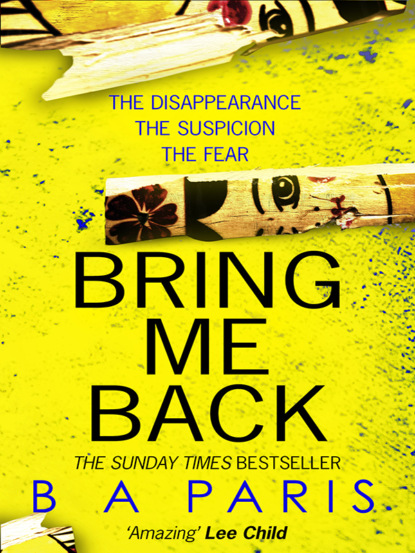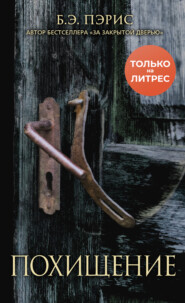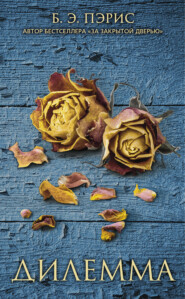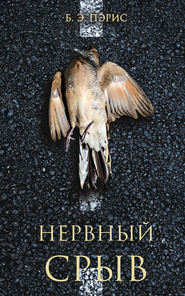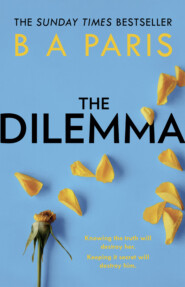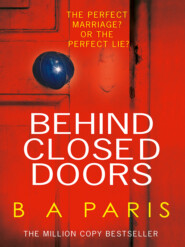По всем вопросам обращайтесь на: info@litportal.ru
(©) 2003-2025.
✖
Bring Me Back: The gripping Sunday Times bestseller now with an explosive new ending!
Автор
Год написания книги
2018
Настройки чтения
Размер шрифта
Высота строк
Поля
You took a long time answering. ‘My dad has cancer. He’s also diabetic. Somebody has to look after him.’
‘I’m sorry.’
You laughed suddenly, unnerving me. ‘Can we talk about something else? I don’t want to be sad on New Year’s Eve.’
‘I’m meant to be going to a party tonight.’ I pointed through the window at a building on the opposite side of the dock. ‘My boss lives on the top floor. We should go.’
You looked doubtful. ‘I don’t really have anything to wear to a party.’
‘You’re fine as you are,’ I told you.
I don’t remember much about the party except feeling as if I’d stepped into a parallel universe. You were completely out of place among the women in their dresses, their nails manicured and polished, their hair styled, and I couldn’t believe it was a world I’d inhabited just a few hours before. It felt stifling and dull, and when Caroline slid her arms around my waist and asked me how I’d enjoyed the theatre, I had trouble remembering she was my girlfriend. I introduced her to you and explained something of what had happened. Maybe it was the mention of a youth hostel, but the story amused her and when she turned and raised her eyebrows at me, I knew she was laughing at you. And my fists clenched, hating her for it.
FIVE (#ulink_543cc3db-db64-5b36-8ef1-9ce01830af8c)
Now
It’s amazing how those two Russian dolls play on my mind. It would be easier if I’d thrown the one I found away, or at least confined it to the drawer in my desk along with the other one, the one that had belonged to Layla. But I keep it close to me, in my pocket, a reminder that I can’t be complacent. Inevitably, though, it brings back memories of Layla. It doesn’t help that Ellen has left her family of Russian dolls standing in a row on the kitchen worktop, instead of stacking them back together again, one inside the other, and returning them to the dining room. I don’t want to ask her to move them because I don’t want to give too much importance to the fact that she hasn’t, or make her think that they make me uncomfortable. But the fact is, they do. Maybe it’s the way Ellen’s eyes are continually drawn towards them, reassuring herself that the smallest one is still there, that it’s not going to suddenly disappear, like Layla did all those years ago.
I’ve just dropped her off at the station in Cheltenham in time for the ten o’clock train to London. She has a lunch meeting with her agent to discuss illustrations for a new book, and is going shopping in the afternoon, so she won’t be home until late. I could have gone with her, gone into the office, but I tend to work from home nowadays. There’s not a lot I can’t do from the bank of screens I’ve installed in my office.
I check the markets, catch up on the news, make a couple of calls, look for new shares to invest in. I usually read the newspapers online, because it’s more practical, but today I have physical copies, bought at the station earlier. So at lunchtime I return to the kitchen, make myself a pot of coffee and a sandwich and, with Peggy at my feet, spend a couple of hours reading the papers cover to cover, instead of only the financial sections, as I normally do. There’s a small paragraph in the Financial Times about Grant James’s investment in Richmond Global Equities, and I’m glad all over again that I managed to pull it off. Harry has done a lot for me in my forty-one years, so it’s a relief to be able to do something in return.
If anyone has shaped my life, it’s Harry. He was my brother’s best friend at the LSE, and when Liam was killed in a motorbike accident not long after graduation, Harry had been there for me. Since then, he’s got me out of trouble and back onto the right path more times than I care to remember. He was there twenty years ago, when I needed to get out of Ireland double-quick, inviting me to stay with him in London while I sorted myself out. A couple of months later, fed up with me mooching round his flat, filled with self-hatred, he gave me a job at Villiers, his investment firm, where I became fascinated with the workings of the markets and quickly earned a reputation for being ruthless. He was there during the nightmare of Layla’s disappearance, hiring the best lawyers and whisking me back to England as soon as the French police allowed me to leave. He was there at the cottage in St Mary’s, helping me look for Layla, using his contacts and printing ‘Missing’ posters, which he arranged to have distributed in and around the Fonches area. He was there six months later, when I could no longer stand the silent recrimination of the empty cottage, taking me back to London, to the flat I still co-owned with him. And he was there nine months after that, when I could no longer bear the London streets that echoed with Layla’s presence, installing me in Simonsbridge, a little village tucked away in the Cotswolds, because he had a friend who was moving abroad and had a house to rent there.
At first, in Simonsbridge, it was no different. I lived the life of a hermit, as I had done in London, with only thoughts of Layla and playing the markets for company. I only ventured out when Harry visited and, unable to stand the stench of despair that permeated the house, dragged me along to The Jackdaw for a drink. Through the fog that clouded my brain, I was dimly aware that Ruby, the landlady, liked me. But I wasn’t interested, not then.
After a few months, Harry tried to get me to go back to work. When I refused, knocking back a glass of whisky with one hand and reaching for the bottle with the other, he told me I needed a dog. So we visited dog home after dog home where I turned down so many potential companions that Harry was bemused. I couldn’t tell him what I was looking for because I didn’t know myself. Then I saw Peggy and when Harry asked me why I’d chosen her, I didn’t dare tell him it was because her coat was the same colour as Layla’s beautiful hair.
During all that time, Harry never once asked what really happened the night Layla disappeared. Ellen has never asked me either. She’s never had any reason to doubt my version of events, which were widely published in the press at the time. It’s why I found myself asking her to marry me; basically, I got caught out in a lie.
When the police questioned me, in the long days and even longer nights that followed Layla’s disappearance, I told them that during our holiday in Megève I’d asked her to marry me and that she had accepted. There was no truth in this, but I needed the police, and everyone else, to believe that everything had been perfect between us during those last few days. As the years passed, I presumed my lie had been laid to rest. Then, a couple of months ago, Ellen, out of the blue, said that Layla must have been very happy when I’d asked her to marry me.
‘Yes, she was,’ I said, taken aback that she’d suddenly brought it up.
‘You must have loved her very much to propose.’ Ellen’s voice was quiet. ‘You hadn’t been together very long.’ She paused, her eyes finding mine. ‘About the same amount of time as us, in fact.’
She was right. I was with Layla for thirteen months before she disappeared and it was over a year since Ellen had moved in with me. I looked back at her, uncertain as to what she was thinking. Was she hoping for the same commitment? She’d never once asked if I loved Layla more than I loved her. But that day, I knew that if I didn’t ask her to marry me, she would think I loved her less. So I ignored the feeling that I was somehow betraying Layla, and proposed.
Ellen had shaken her head. ‘I don’t want you to feel that you have to marry me just because you proposed to Layla.’
I hesitated, because I didn’t want her to think less of me. But maybe it was time to come clean. ‘Actually, I didn’t,’ I admitted.
‘What do you mean?’
‘It was something I said to the police at the time of my arrest, to make it look better.’
‘So you hadn’t asked her to marry you?’
‘No.’
‘But you were going to,’ she stated. And because I wanted her to feel that I loved her more than I’d loved Layla, I decided to lie. ‘No.’
She looked at me in surprise. ‘No?’
‘No,’ I repeated. But the truth was, I had been going to propose to Layla, on her twentieth birthday, the month after we got back from Megève. I’d had it all planned, I’d even bought the ring.
But then she spoiled everything.
SIX (#ulink_bc805e9d-475e-5264-a23d-84a920b3d465)
Before
The day after the New Year’s Eve party, I told Caroline it was over. And when you tried to move out of my flat, a few days later, I did everything I could to persuade you to stay. Without asking Harry, I told you that you could have the study, at least until you found a job, saying that he wouldn’t mind. But you were adamant that you wanted to move into a youth hostel, telling me that if you were to make a life for yourself in London, you needed to meet other young people. The realisation that you thought of me as old was hard to take – hell, I was only twenty-seven. But in your eyes, I was nothing more than an older guy who had given you shelter for a couple of days.
In the event, you stayed a little over a week. For a man who lives in the present, I can still picture every minute of the day you moved out. I helped you move into the hostel you’d found, hoping you’d soon become disillusioned with sharing a room with five other people. Your idea was to find a job as soon as possible, which would allow you to move into a flat-share.
When it came to saying goodbye, I gave you my business card, telling you to call me if you needed help of any kind. And then I went back to my flat and drank half a bottle of whisky, moaning at Fate for leading you to me when you weren’t going to become a permanent fixture in my life.
Harry was bemused, then fascinated that I’d fallen so hard for you, Layla Gray. He pointed out that my girlfriends to date had all been smart young city women and that you were unsophisticated in comparison. He couldn’t see that that was the biggest attraction for me. Even before you, I’d become increasingly disenchanted with the uniformity of it all; the smart business suits, the killer heels, the sharp fingernails that raked my back with dreary repetition during sex. Harry tried to tell me that what I felt was infatuation and I tried to believe him. I also tried to forget you, working and partying twice as hard as before, to fill the void you’d left in my life.
I lived in hope of you phoning me, just to let me know how you were getting on. When a month passed without news, I told myself that you never would. And then, two months after you first disappeared from my life, you walked back in.
SEVEN (#ulink_c94bdab7-b32d-5075-a26b-605c86d70b2f)
Now
I look at Ellen across the table, her head bent over her bowl of muesli, Greek yoghurt and blueberries, and find myself comparing it to Layla’s breakfasts of toast and chocolate spread. I frown, annoyed with myself. I’ve been doing that a lot lately, not just thinking about Layla, but comparing Ellen to her.
Sensing my eyes on her, Ellen looks up. Although I’m staring at her, I don’t see her, I see Layla, which is strange because physically, she’s nothing like Layla. Maybe it’s her hazel eyes. Are they what attracted me to her in the first place, because they reminded me of Layla’s?
‘So,’ she says, ‘any plans for today?’
I force myself away from the past and back to the present. But it leaves behind a trace of anxiety, spawned from the two Russian dolls we found, and I look over at Ellen’s set suspiciously, because she still hasn’t put them away.
‘I’ll probably go for a run. Maybe water the garden first. It’s as dry as a bone.’ She smiles approvingly and I can’t help remembering how Layla had laughed when I told her that one day, I wanted a beautiful garden in the country so that I could grow my own vegetables.
‘Gardening is for old men!’ she’d mocked. I’d never mentioned it again.
‘Have you remembered that I’m going into Cheltenham this morning, to the beauty salon?’ Ellen asks.
I hadn’t, but I should have, because every three weeks Ellen subjects herself to an intense beauty regime; waxing, tweezing, a manicure and God knows what else, followed by a session with her hairdresser, who operates from the same salon. Ellen takes care of herself in a way that Layla never did. Layla never cared much how she looked.
‘Maybe I’ll come and meet you for lunch,’ I say.
‘That’ll be lovely,’ she smiles.
I stand up, take my plate and reach for hers.





